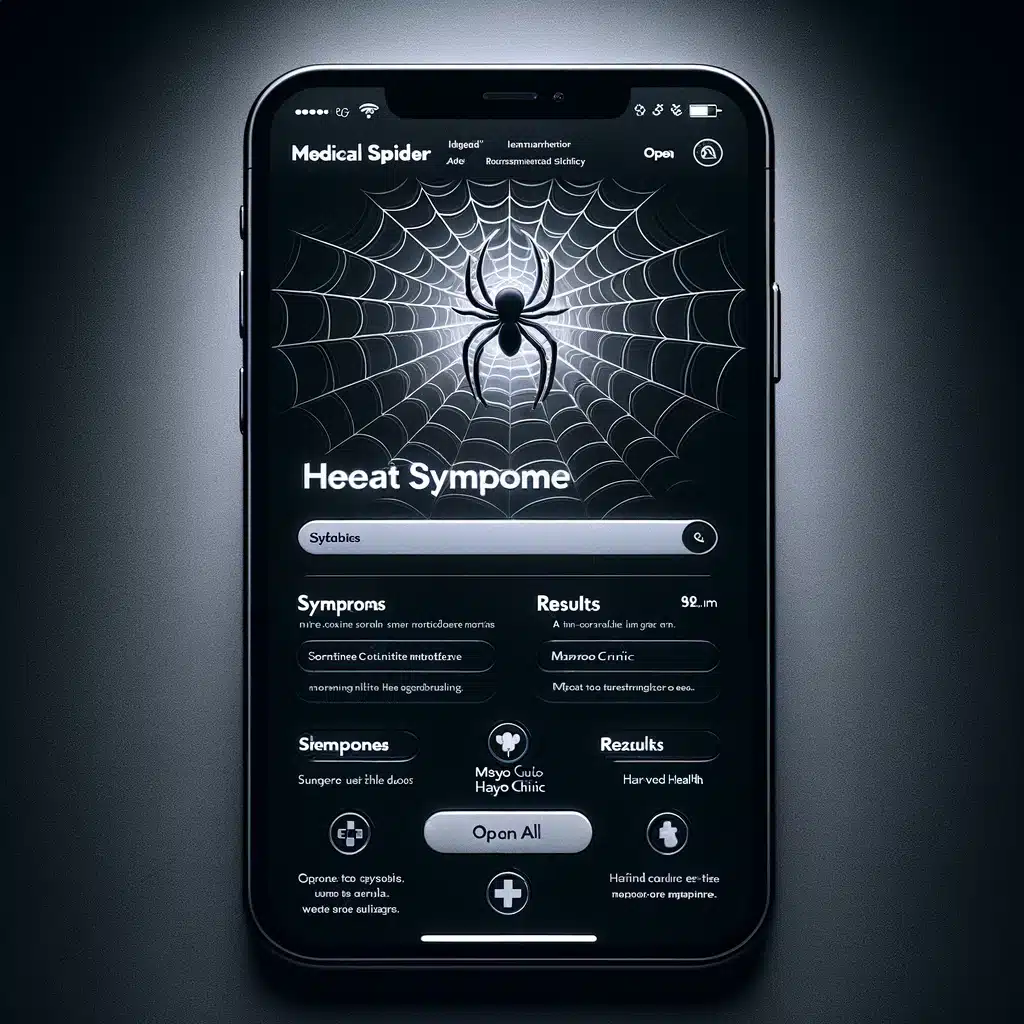
Approx. read time: 8 min.
Post: Medical Spider: Your Ultimate Symptom Checker
Medical Spider Symptom/Condition Checker: By Bernard Aybout
Search History
Introducing the Medical Spider: Your Ultimate Symptom Checker
In the world of digital health, having a reliable tool to check symptoms and find related medical information is invaluable. Meet the Medical Spider, a search engine bot designed to help users quickly find information about their symptoms from various trusted sources. This innovative tool combines user-friendly design with powerful search capabilities to offer a seamless and efficient health-checking experience.
What is the Medical Spider?
The Medical Spider is a web-based application that allows users to input symptoms and receive related medical information from a wide range of reputable sources. It’s designed to mimic the thoroughness and precision of a spider weaving its web, ensuring that no relevant information is left out. Whether you’re experiencing a minor ailment or something more serious, the Medical Spider helps you understand your symptoms better by providing links to detailed information from trusted health websites.
Moreover, the Medical Spider comes with a prebuilt list of 2000 conditions and symptoms, offering an extensive database that covers a vast spectrum of health issues. This extensive list ensures that users can find relevant information for virtually any symptom they experience, making it a reliable tool for anyone seeking to understand their health better.
Key Features
- User-Friendly Interface: The Medical Spider features an intuitive and dark-themed user interface that is easy on the eyes, especially during extended use. The interface includes a clear input field, a submit button, and a results section where users can view the links to relevant medical information.
- Extensive Symptom List: The bot includes a comprehensive list of symptoms that users can choose from, making it easier to find relevant information. The list is integrated into a
datalistelement, providing suggestions as you type. - Multiple Trusted Sources: When you enter a symptom, the Medical Spider searches multiple trusted sources such as Google, WebMD, Mayo Clinic, Harvard Health, Cleveland Clinic, and more. This ensures that you get a wide range of perspectives and detailed information about your symptoms.
- Efficient Link Management: The bot not only provides links to relevant information but also includes an “Open All” button. This feature allows users to open all the relevant links in new tabs with just one click, saving time and effort.
- Dynamic and Responsive: The Medical Spider dynamically updates the list of related symptoms and links based on the user’s input. This real-time response ensures that users always have access to the most relevant information.
- Search History: The Medical Spider saves your past searches in a search history, allowing you to quickly revisit previous queries. You can view, click on, and clear your search history as needed.
How Does It Work?
- User Input: The user enters a symptom into the input field. As they type, the
datalistprovides suggestions based on a predefined list of symptoms. - Form Submission: When the user submits the form, JavaScript handles the event by preventing the default form submission behavior.
- Symptom Matching: The entered symptom is matched against the predefined list to find related symptoms. This helps provide more comprehensive search results.
- Generating Links: For each related symptom, the bot generates search links from various trusted sources. Each link is dynamically created and added to the results section.
- Displaying Results: The results are displayed in the results section as clickable links. If no related symptoms are found, the bot still provides links based on the original input symptom.
- Open All Feature: The “Open All” button allows users to open all the generated links in new tabs. This feature uses JavaScript to manage the opening of multiple links with a slight delay to avoid overwhelming the browser.
- Search History: The user’s search history is saved locally, allowing them to revisit previous searches. Users can click on past searches to quickly reload the results or clear the history entirely.
The Technology Behind the Medical Spider
- HTML: Forms the structure of the web page, including the input fields, buttons, and results section.
- CSS: Provides the styling for the web page, giving it a modern and dark-themed appearance that aligns with the “spider” aesthetic.
- JavaScript: Powers the dynamic functionality, including form handling, symptom matching, link generation, and the “Open All” feature.
Conclusion
The Medical Spider is a powerful tool that simplifies the process of checking symptoms and finding reliable medical information online. Its intuitive design and comprehensive functionality make it an essential resource for anyone looking to understand their health better. Whether you’re a health enthusiast or someone seeking quick answers to health-related questions, the Medical Spider is here to assist you with precision and efficiency.
With the capability to search across 35 different medical search engines, the Medical Spider ensures that you receive the most comprehensive and reliable medical information available. The powerful synergy of 1 search equaling 35 searches means that you get the best possible results every time.
Medical Search Engines Used
- WebMD
- Mayo Clinic
- Harvard Health
- Cleveland Clinic
- Cochrane Library
- PubMed
- NLM National Library of Medicine
- MedlinePlus
- Google Scholar
- ScienceDirect
- PsycINFO
- MedicineNet
- Medscape
- UpToDate
- OpenMD
- NIH National Institutes of Health
- CDC Centers for Disease Control and Prevention
- WHO World Health Organization
- NHS National Health Service
- American Heart Association (AHA)
- Johns Hopkins Medicine
- NCI National Cancer Institute
- Healthline
- MedPage Today
- BMJ British Medical Journal
- JAMA Journal of the American Medical Association
- FDA Food and Drug Administration
- ACS American Cancer Society
- Medtube
- Free Medical Videos
- Eyetube
- Coursera
- CSurgeries
- DNATube
A comprehensive list of URLs for medical authorities worldwide can be extensive, but here are some of the most prominent and reputable organizations. These links include national and international health agencies, research institutions, and specialized medical organizations.
International Organizations
- World Health Organization (WHO): https://www.who.int
- Centers for Disease Control and Prevention (CDC): https://www.cdc.gov
- National Institutes of Health (NIH): https://www.nih.gov
- European Centre for Disease Prevention and Control (ECDC): https://www.ecdc.europa.eu
- Pan American Health Organization (PAHO): https://www.paho.org
- Food and Drug Administration (FDA): https://www.fda.gov
United States
- American Medical Association (AMA): https://www.ama-assn.org
- Mayo Clinic: https://www.mayoclinic.org
- Johns Hopkins Medicine: https://www.hopkinsmedicine.org
- Cleveland Clinic: https://my.clevelandclinic.org
- MedlinePlus (NLM): https://medlineplus.gov
Canada
- Health Canada: https://www.canada.ca/en/health-canada.html
- Canadian Medical Association (CMA): https://www.cma.ca
- Public Health Agency of Canada (PHAC): https://www.canada.ca/en/public-health.html
Europe
- NHS (National Health Service) – UK: https://www.nhs.uk
- National Institute for Health and Care Excellence (NICE) – UK: https://www.nice.org.uk
- Institut Pasteur – France: https://www.pasteur.fr/en
- Robert Koch Institute – Germany: https://www.rki.de
Australia
- Australian Government Department of Health: https://www.health.gov.au
- Royal Australian College of General Practitioners (RACGP): https://www.racgp.org.au
Asia
- Ministry of Health, Labour and Welfare – Japan: https://www.mhlw.go.jp/english
- National Health Commission – China: http://en.nhc.gov.cn
- Indian Council of Medical Research (ICMR): https://www.icmr.gov.in
Middle East
- Saudi Ministry of Health: https://www.moh.gov.sa/en
- Health Authority – Abu Dhabi (HAAD): https://www.haad.ae/haad/tabid/58/Default.aspx
Africa
- Africa Centres for Disease Control and Prevention: https://africacdc.org
- South African National Department of Health: http://www.health.gov.za
Specialized Medical Organizations
- American Cancer Society (ACS): https://www.cancer.org
- American Heart Association (AHA): https://www.heart.org
- Alzheimer’s Association: https://www.alz.org
- Diabetes Canada: https://www.diabetes.ca
- World Federation of Neurology (WFN): https://www.wfneurology.org
This list includes major health authorities and specialized organizations across various regions and medical fields. If you need more specific links or additional organizations, feel free to ask!
Troubleshooting – Open All Feature not working….
Some browsers have built-in restrictions that prevent opening multiple searches simultaneously. If you encounter this issue, you may need to adjust your browser settings to allow multiple tabs to open at once. Look for options related to tab management, pop-up settings, or privacy settings to enable this feature.
Additionally, due to the rapid speed at which these websites are accessed, they might suspect automated behavior and challenge you with a CAPTCHA or other tests to verify that you’re not a bot. This is a common security measure to protect websites from automated scripts and potential abuse. So, don’t take it personally—it’s just a way for them to ensure that real humans are interacting with their content.
Here’s a step-by-step guide to help you adjust your browser settings:
- Chrome:
- Go to Settings.
- Click on “Privacy and security.”
- Look for “Site Settings” and then “Pop-ups and redirects.”
- Allow pop-ups for the sites you trust.
- Firefox:
- Open the menu and go to Options.
- Select “Privacy & Security.”
- Under “Permissions,” check the box for “Block pop-up windows,” then click “Exceptions” to allow specific sites.
- Edge:
- Go to Settings.
- Click on “Cookies and site permissions.”
- Scroll down to “Pop-ups and redirects” and add exceptions as needed.
By adjusting these settings, you can ensure a smoother browsing experience. And remember, those CAPTCHAs are just a security measure to keep the internet a safer place for everyone.
Related Posts:
What strategies can I employ to manage and prevent leaky gut syndrome?
When Your Mental State Takes Over: Overcoming Negative Patterns
What Skin Issues Reveal About Your Internal Organ Health
Broken Heart Syndrome and Its Impact on Caregivers: A Silent Health Crisis
AI Tech and medical Healthcare









